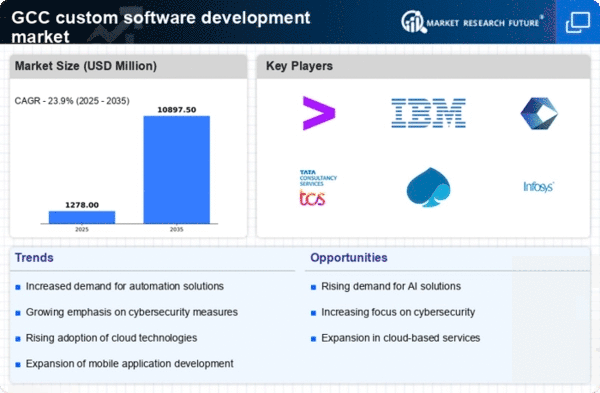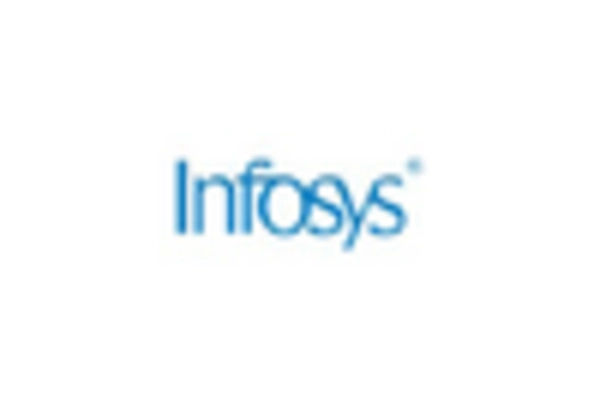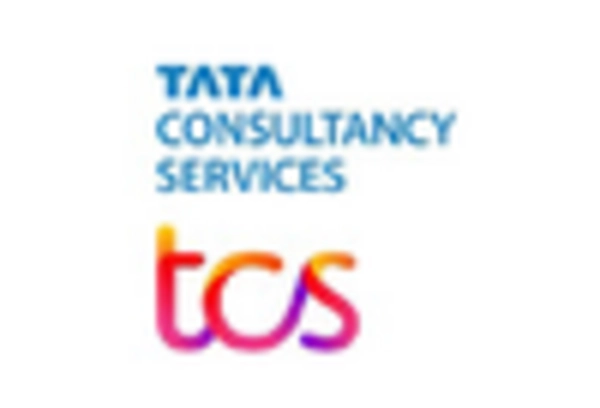Emphasis on Enhanced User Experience
The custom software development market is increasingly driven by the emphasis on delivering enhanced user experiences. Organizations are recognizing that user-centric design is crucial for the success of software applications. As a result, there is a growing demand for custom solutions that prioritize usability and engagement. Companies are investing in user research and design thinking methodologies to create software that resonates with their target audiences. This trend is particularly evident in sectors such as e-commerce and mobile applications, where user experience can significantly impact customer retention and satisfaction. The focus on user experience is likely to propel the custom software-development market forward, as businesses strive to create intuitive and engaging applications.
Rising Digital Transformation Initiatives
The custom software development market is experiencing a surge due to the increasing emphasis on digital transformation across various sectors in the GCC. Organizations are recognizing the need to modernize their operations and enhance customer experiences through tailored software solutions. This shift is driven by the desire to improve efficiency and competitiveness in a rapidly evolving digital landscape. According to recent data, investments in digital transformation initiatives in the GCC are projected to reach $20 billion by 2025, indicating a robust growth trajectory. As businesses seek to leverage technology for operational excellence, the demand for custom software solutions is likely to rise, positioning the custom software-development market as a critical enabler of this transformation.
Increased Investment in Technology Startups
The custom software development market is benefiting from a notable increase in investment directed towards technology startups within the GCC. Venture capital funding for tech startups has surged, with estimates suggesting that investments could exceed $1 billion in 2025. This influx of capital is fostering innovation and encouraging the development of cutting-edge software solutions tailored to specific market demands. As startups emerge with unique offerings, established companies are increasingly collaborating with these innovators to enhance their software capabilities. This dynamic is likely to stimulate growth in the custom software-development market, as businesses seek to leverage the latest technological advancements to stay competitive.
Growing Focus on Industry-Specific Solutions
The custom software development market is witnessing a trend towards the creation of industry-specific solutions tailored to meet the unique needs of various sectors. Industries such as healthcare, finance, and logistics are increasingly seeking specialized software that addresses their operational challenges. This trend is fueled by the recognition that generic solutions often fall short in meeting specific requirements. For instance, the healthcare sector in the GCC is expected to invest approximately $5 billion in custom software solutions by 2025, reflecting a growing demand for tailored applications. As organizations strive for greater efficiency and compliance, the custom software-development market is likely to expand to accommodate these specialized needs.
Regulatory Compliance and Data Protection Needs
The custom software development market is increasingly influenced by the need for regulatory compliance and data protection. As data privacy regulations become more stringent in the GCC, organizations are compelled to adopt software solutions that ensure compliance with these laws. This has led to a heightened demand for custom software that incorporates robust security features and data management capabilities. Companies are investing in solutions that not only meet regulatory requirements but also enhance their overall data governance strategies. The market for compliance-focused software is projected to grow significantly, as businesses recognize the importance of safeguarding sensitive information while maintaining operational efficiency.
















